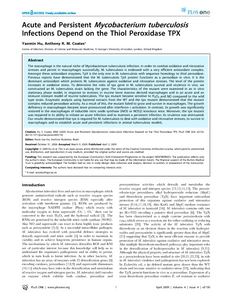Hu, Y; Coates, AR
(2009)
Acute and persistent Mycobacterium tuberculosis infections depend on the thiol peroxidase TpX.
PLOS ONE, 4 (4).
e5150-.
ISSN 1932-6203
https://doi.org/10.1371/journal.pone.0005150
SGUL Authors: Hu, Yanmin
![[img]](https://openaccess.sgul.ac.uk/79/1.hassmallThumbnailVersion/pone.0005150.pdf)  Preview |
|
["document_typename_application/pdf; charset=binary" not defined]
Published Version
Download (1MB)
| Preview
|
Abstract
The macrophage is the natural niche of Mycobacterium tuberculosis infection. In order to combat oxidative and nitrosative stresses and persist in macrophages successfully, M. tuberculosis is endowed with a very efficient antioxidant complex. Amongst these antioxidant enzymes, TpX is the only one in M. tuberculosis with sequence homology to thiol peroxidase. Previous reports have demonstrated that the M. tuberculosis TpX protein functions as a peroxidase in vitro. It is the dominant antioxidant which protects M. tuberculosis against oxidative and nitrosative stresses. The level of the protein increases in oxidative stress. To determine the roles of tpx gene in M. tuberculosis survival and virulence in vivo, we constructed an M. tuberculosis strain lacking the gene. The characteristics of the mutant were examined in an in vitro stationary phase model, in response to stresses; in murine bone marrow derived macrophages and in an acute and an immune resistant model of murine tuberculosis. The tpx mutant became sensitive to H(2)O(2) and NO compared to the wild type strain. Enzymatic analysis using bacterial extracts from the WT and the tpx mutant demonstrated that the mutant contains reduced peroxidase activity. As a result of this, the mutant failed to grow and survive in macrophages. The growth deficiency in macrophages became more pronounced after interferon-gamma activation. In contrast, its growth was significantly restored in the macrophages of inducible nitric oxide synthase (iNOS or NOS2) knockout mice. Moreover, the tpx mutant was impaired in its ability to initiate an acute infection and to maintain a persistent infection. Its virulence was attenuated. Our results demonstrated that tpx is required for M. tuberculosis to deal with oxidative and nitrosative stresses, to survive in macrophages and to establish acute and persistent infections in animal tuberculosis models.
| Item Type: |
Article
|
| Additional Information: |
©2009 Hu et al. This is an open-access article distributed under the terms of the Creative Commons Attribution License, which permits unrestricted use, distribution, and reproduction in any medium, provided the original author and source are credited. |
| Keywords: |
Acute Disease, Animals, Base Sequence, Cells, Cultured, Chronic Disease, Cysteine Endopeptidases, DNA Primers, Mice, Mycobacterium tuberculosis, Tuberculosis |
| SGUL Research Institute / Research Centre: |
Academic Structure > Infection and Immunity Research Institute (INII) |
| Journal or Publication Title: |
PLOS ONE |
| ISSN: |
1932-6203 |
| PubMed ID: |
19340292 |
| Web of Science ID: |
19340292 |
| Dates: |
| Date |
Event |
| 2009-04-02 |
Published |
|
  |
Download EPMC Full text (PDF)
|
 |
Download EPMC Full text (HTML)
|
 |
Go to PubMed abstract |
| URI: |
https://openaccess.sgul.ac.uk/id/eprint/79 |
| Publisher's version: |
https://doi.org/10.1371/journal.pone.0005150 |
Statistics
Item downloaded times since 30 Apr 2012.
Actions (login required)
 |
Edit Item |




